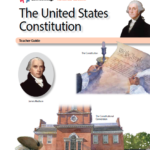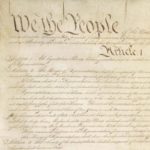This lesson engages students in a study of the Constitution to learn the significance of “Six Big Ideas” contained in it. Students analyze the text of the Constitution in a variety of ways, examine primary sources to identify their relationship to its central ideas, and debate the core constitutional principles as they relate to today’s political issues. (Duration: 45-minute segments, up to 4.5 hours.)
Antifederalist Objections to the Constitution

This short video highlights two major Antifederalist objections to the Constitution. They were concerned that the Constitution did not contain a bill of rights, something many colonial charters and state constitutions had included. Secondly, the Constitution significantly reduced state sovereignty in favor of a stronger central government. Professor John Kaminski examines the Antifederalist concerns about the ambiguous nature of the power of the central government.
Celebrating the U.S. Constitution
Students develop an understanding and appreciation of the importance of the U.S. Constitution. This lesson plan is a winner of the We the Future contest.
The United States Constitution (CKHG Unit)

This unit explores the creation and central ideas of the United States Constitution. Across 18 lessons, students learn how, after the Revolution, the Founding Fathers worked to confront the shortcomings of the Articles of Confederation. They learn why the Bill of Rights was added to the Constitution, and explore reasons why the Constitution has survived as the guiding document of government in the United States.
Jama v. INS (2005)
May an alien be deported to his country of birth if that country lacks a functioning central government that is able to accept his return? This case summary shows how the Supreme Court answered that question in 2005.
